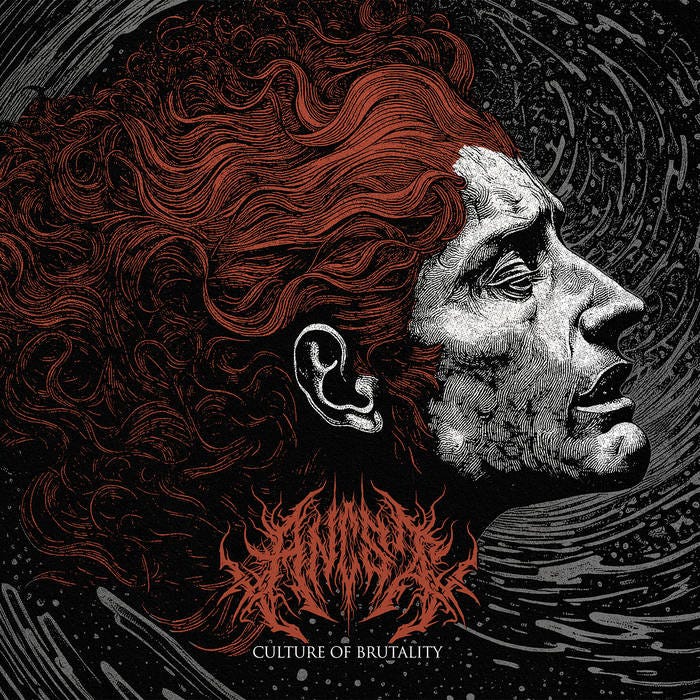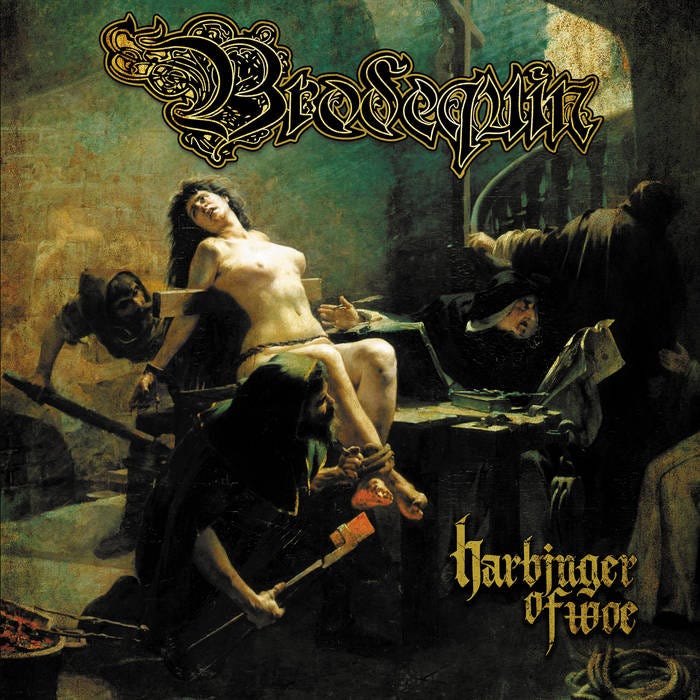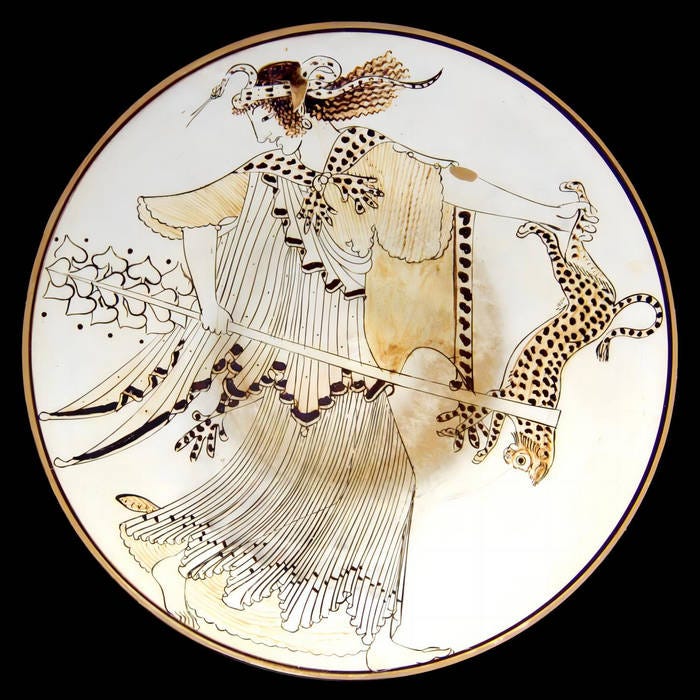Here’s a tour of how I used music in my day-to-day life throughout the past year, with a focus on heavy and heavy-adjacent stuff. These five aren’t the only albums I’ve loved this year, so let’s start with some honorable mentions.
Out of the gates, Judas Priest’s Invincible Shield made a play for my album of the year. The brutal power metal of “Panic Attack” hit with incredible force—a force the band not only replicated but multiplied in a live setting. Sadly, the album is just a bit long for long’s sake. Given the overall strength of this release, there will doubtlessly be a next time. I’m begging them to ignore streaming incentives and opt for an 8-track neck-breaker when it comes.
The Lemon Twigs’ A Dream Is All We Know may be the most well-crafted album of the year, but I’m not sure what more I can say about it than, “Man, I really love how much this band gets and loves The Beatles and The Byrds.” But really, what more needs to be said? The same goes for Mother of Graves’ Periapt of Absence—just swap in Katatonia and Rapture in place of the Fabs and the Flappies.
Nimbifer made my favorite black metal album of the year—a bare-bones but melodically sophisticated soundtrack to getting extremely gassed up to run skull-first into pain. Obscene’s Agony and Wounds was a few Necroticism-worshipping guitar solos away from cracking this list, but that doesn’t come easy. Meanwhile, Leatherhead seems on the verge of making the leap from pure heavy-metal traditionalists to a unit that might make Jim Matheos raise a bushy eyebrow.
Blood Incantation’s Absolute Elsewhere is either your favorite death metal album of the year, or you’re soft-blocking every critic who listed it. Personally, I think the syncopated section during the Middle Eastern riff after the ambient part of the first track is about as cool as heavy music got this year.
Theurgy made the prettiest brutal death metal album of the year—it’s like getting bonked on the head with a two-ton hammer made of billions of machine-pressed dandelions.
Ancst – Culture of Brutality
I pegged this as one of my albums of the year before the first track even wrapped. Sometimes you just know.
Ancst are, I assume, a band motivated by strong political leanings that I may consider deeply impractical or perhaps even dangerous to a well-structured social order. Not sure. Don’t care. It’s immaterial because whatever’s behind this recording is so deeply felt that it vaults the interpretive gap into my mind as something I can use to combat the pain of being human in this complicated existence.
Culture of Brutality reminds me of being about half my age and fancying myself a tough feller who “only listened to Nasum” but also scoured the Deathwish catalog for records with artsy-fartsy, collage-style cover art that might, at least through osmosis, impart upon me an air of sophistication and depth I utterly lacked. That wasn’t the worst place to be.
There’s a certain nobility in trying to mold yourself into some warrior-poet you invented; there’s energy there. “Get tough or get fucked,” I say exactly once each morning as I belly up to the plateful of responsibilities I’ve accrued for myself—entirely on purpose.
This album is tough tough. It’s 40 sharp-elbowed, melodic riffs and eschaton-summoning breakdowns fashioned into 20 grindy metalcore tracks. We’re all free to sort through the nuances of the challenges we face in daily life, but sometimes you can just bark at them. Tell your problems to watch this shit while you pick up a heavy thing that … well … isn’t that heavy, but it’s heavier than what you could pick up before.
There’s a delightful lack of nuance here that I would never brook in any rhetorical arena, but it’s absolutely necessary for days when I need to ball myself into a fist and club my way through. Twenty-year-old me told me there’d be days like that. He wasn’t wrong about everything.
Kosmodome – Ad Undas
You never really stop trying to figure out how to be a person. We suss out some basics, like how to put just enough butter on a cast iron so that your two-egg omelet slides right onto your plate. How to appear sufficiently engaged in workplace meetings while surreptitiously Googling Dark Angel back patches. How to spell “surreptitiously.” But I think most of us really just circle the mark of “how to know and be oneself” without ever really hitting home.
You just gotta try.
Through scuttled routines, dashed aspirations, and dark nights of the soul in which the tiny David Frost in your mind bee-stings you with questions like: “Are you really doing your best for them?” “Are you ready for what’s next?” “Have you wasted too much time?” You just gotta… try.
Kosmodome’s Ad Undas sounds like trying. But it doesn’t speak in the sweaty, performative language of self-improvement. It looks at the world, how we walk through it, and unselfconsciously admits: “Man, I’m not so good at this! But I would like to be.”
Kosmodome, who come to us via Norway, deliver their lyrics in English that, while perhaps lacking a little in idiomatic acuity, delightfully thread the needle between prosaic and poetic. Is there a more elegant way to express a sentiment like, “Just like photosynthesis, I need the sun to flourish”? Eh, maybe. I don’t really want to hear it. I like the way Kosmodome says it. Feels true. Feels like something I’ve felt while rotting in front of my laptop in the waiting place—the contested border between productivity and entropy.
It’s spoken in a voice that comes from deep inside and says, “Hey man, go for a walk. Still a few hours of sun left.”
“Paralyzing
Fear of Failure
Hesitating Thoughts
I cannot control
The Strength of the Tide
But I can learn how to ride the waves.”
Maybe… gotta keep trying.
But, of course, none of this would be particularly poignant if the band couldn’t dance. But they’ve got the moves. Here we have incredibly adept, recorded-as-it’s-played prog that lovingly wraps its arms around the ’70s masters. Locked in without a grid. Tricky in the pursuit of melody and movement, not trickiness itself. Dynamic, too. The kind of stuff where the gain in the guitars crests and recedes with the intensity of the music’s story—something you don’t get much if you spend enough time pressing your mind through the heavy metal meat grinder.
Really, it’s the kind of album Opeth would make if their post-Watershed pivot were infused as much with their love for ’70s prog and the candle it can light in one’s soul as with their resentment toward their old fans for sometimes getting drunk and wearing Suffocation T-shirts at their shows.
I know that’s not particularly generous. Gotta be better. Gotta try.
Brodequin - Harbinger of Woe
I laugh a lot listening to death metal. Not ironically. NEVER ironically. It’s a nervous laughter that I reckon emanates from my brain short-circuiting as it tries to process waves hands in the general direction of a guy in camo pants and a long-sleeve Hate Eternal tee violating the Geneva Convention on a 7-string Jackson *all this.* But Brodequin triggered a different kind of chuckle. The kind of chuckle you may experience if you’re lucky enough to spend the holiday season listening to pleasant piano twinklings with your family while you make dinner and play cards, and then retiring to your dad-den to blast “Harbinger of Woe” directly into your brain and comprehending that both are technically the same form of expression.
There are many, many death metal albums that are more brutal than Brodequin’s latest, but few hit as hard while remaining recognizably music. See, at least for me, there is a line of diminishing returns in brutal death metal when the pummeling becomes so disconnected from recognizable conventions that your brain doesn’t even attempt to process it as music, and thus doesn’t interpret it as an intense expression of the form. Brutal death metal untethered from a musical anchor hits my brain like a malfunctioning garbage disposal or a guitar cable making purchase with a faulty audio jack. Brodequin beats my brakes off because they peer over the border of extreme music but never cross it. Within the barrage, there are riffs that have me chromatically air-guitaring and precisely timed tempo shifts that get my jaw grinding in a way that will blow my dental coverage limit well before I get around to next year’s list.
By no means is this my call for the most extreme proprietors of the genre to step back across the line—everyone’s brain chemistry is going to interpret psychotic shifts of air pressure in the own way—but my love for this album is directly rooted in the hilarious fact that Brodequin are, in fact, making music.
Hoplites – ΠΑΡΑΜΑΙΝΟΜΈΝΗ
I failed the “try not to stank-face” challenge exactly 49 seconds into
ΠΑΡΑΜΑΙΝΟΜΈΝΗ—which was only about three seconds after the album’s first guitar riff hit, and about four seconds before the album’s first saxophone barrage landed, which is when I also borked the “try not to wage a doomed counter-offensive against the invisible swarm of wasps hovering around your head” challenge.
Man, this album just bleeds for it, baby.
What’s it sound like? It sounds like what maybe you sound like when you pick up your guitar for the first time in a week and somehow conjure a particularly brutal thrash riff that you’ll never be able to turn into a full song—but hammering it out at least gives you an ecstatic sense of discovery for about 15 seconds. That’s this album: a conveyor belt of ecstatic, brutal thrash moments. A perpetual pounding so razor-sharp that it simply couldn’t be improvised, yet so free of constraints and convention that—well, how could it not be?
In an interview conducted by Jellybones (and cited in Ian Chainey’s Back to Zeuhl session for the Black Market), J.L., the man behind Hoplites, recalls progressively losing his marbles to Soviet-era thrashers Aspid:
“I would achieve this state. I was going crazy inside my dormitory, to the point of talking to myself, totally in delirium.”
Been there, bro? I hope so. It’s one of the very best parts of walking this left-hand path. To pull one straw at random, I remember once washing dishes in my postage-stamp sized apartment on LA’s Eastside while blasting Ride the Lightning through a chintzy portable speaker and flexing like a chimpanzee who’d sensed a mating-aged rival hove into his territory. I was sudsed from the elbow down, communing with the gallops in the main riff of “Trapped Under Ice” at a near-spiritual level.
This album will give you that very specific kind of religion.
A note on the use of saxophone throughout this album: YES. Though it appears on only a few tracks, it’s reliably conscripted like a flanking unit of harmonically sophisticated Hessians—a pincer movement of pure delirium.
I’m not sure where J.L. goes next from here, but signs point to ΠΑΡΑΜΑΙΝΟΜΈΝΗ being Hoplites’ last. I can only hope that wherever the future takes him, it’s in pursuit of that feeling of brutal ecstasy he captures so well here.
delving - All Paths Diverge
Back in September, I had a work trip that took me away from my pregnant wife and two-year-old son for three days. I hated it. I also selfishly enjoyed every second of it.
I’m a work-from-home drone, so I spend a fair amount of time alone while my son’s in daycare, but this was intentional alone time. Time I could spend stepping into a bar to enjoy some conservatory kids sharpening their chops, ordering a plate of chicken parm at a local bar and pretending I’m the protagonist in a lost Billy Joel song, or going for a walk with no particular destination. All Paths Diverge is the soundtrack for that walk: shimmering and curious guitar lines that lift you to a higher plane to ponder how the ants below are doing their little ant tasks. You’re an ant, too, of course—but you’re outside the colony for the moment. Just going for a medium-sized ant-walk that may prompt a severely German documentary filmmaker to ask, “Can ants go insane?” Nope! I’m just going for a walk, man!
There’s something unearthly about the sounds on the Kraut-rockin’ All Paths Diverge, which is not to say the performance feels robotic or cold, but that the melodies and tones are so fresh and unusual that you feel a little unmoored from your day to day. Like you’re watching the sun rise at a not-so-typical angle in a faraway place, as an ant, on a walk.
This album followed me everywhere through this year. Yes, during the rare long walks alone or long runs around town, but also fortifying me through the most important walk of all—the one back home.








